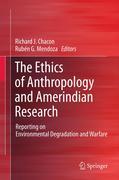
The ethics of anthropology and Amerindian research: reporting on environmental degradation and warfare
Chacon, Richard J.
Mendoza, Rubén G.
The decision to publish scholarly findings bearing on the question of Amerindian environmental degradation, warfare, and/or violence is one that weighs heavily on anthropologists. This burden stems from the fact that documentation ofthis may render descendant communities vulnerable to a host of predatory agendas and hostile modern forces. Consequently, some anthropologists and community advocates alike argue that such culturally and socially sensitive, and thereby, politically volatile information regarding Amerindian-induced environmental degradation and warfare should not be reported. This admonition presents a conundrum for anthropologists and other social scientists employed in the academy or who work at the behest of tribal entities. This work documents the various ethical dilemmas that confront anthropologists, and researchers in general,when investigating Amerindian communities. The contributions to this volume explore the ramifications of reporting--and, specifically,--of non-reporting instances of environmental degradation and warfare among Amerindians. Collectively, the contributions in this volume, which extend across the disciplines of archaeology, anthropology, ethnohistory, ethnic studies, philosophy, and medicine, argue that the non-reporting of environmental mismanagement and violence in Amerindian communities generally harms not only the field of anthropology but the Amerindian populations themselves. Addresses particular ethical concerns that face all branches of anthropology contributions come from archaeology, anthropology, ethnic studies specialists, philosophy, and medicine. Thoroughly investigates numerous case studies inAmerindian populations, such as the Ohio River Valley communities, the Mayans, and the Aztecs. Includes a chapter from the perspective of an Amerindian. INDICE: Shepard Krech III (Brown University) “Forward.” 1. Richard J. Chacon (Winthrop University) and Rubén G. Mendoza (California State U. Monterey Bay) “Introduction.”-.2. Christopher W. Schmidt (University of Indianapolis) andRachel A. Lockhart Sharkey (University of Indianapolis) “Ethical and Political Ramifications of the Reporting/Non-reporting of Native American Ritualized Violence.”. 3. Charles R. Cobb (South Carolina Institute of Archaeology and Anthropology) and Dawnie Wolfe Steadman (Binghamton University) “Pre-Columbian Warfare and Indecorous Images in Southeastern North America.”.-4. David H. Dye (University of Memphis) and M. Franklin Keel (Bureau of Indian Affairs) “The Portrayal of Native American Violence and Warfare: Who Speaks for the Past?”. 5.Brooke Bauer (University of North Carolina, Chapel Hill) “Catawba Indians’ Adaptive Response to Colonialism.”.-6. Kitty F. Emery (Florida Museum of NaturalHistory) and Linda Brown (George Washington University) “Maya Hunting Sustainability: Perspectives From Past and Present.”.-7. Arthur A. Demarest (Vanderbilt) and Brent Woodfill (U. of Louisiana, Lafayette) “Sympathetic Ethnocentrism, Repression, and Auto-repression of Q’eqchi’ Maya Blood Sacrifice.”.-8. Richard D. Hansen (Idaho State University) “Relativism, Revisionism, Aboriginalism,and Emic/Etic Truth: The Case Study of Apocalypto.”.-9. Rubén G. Mendoza (California State U. Monterey Bay) and Shari René Harder (California State U. Monterey Bay) “Mythologies of Conquest: Demystifying Amerindian Warfare and European Triumphalism in the Americas.”.-10. John W. Hoopes (University of Kansas) “Imagining Human Alteration of Ancient Landscapes in Central and South America.”.-11.Dennis E. Ogburn (UNC Charlotte) “Overstating, Downplaying and Denying Indigenous Conquest Warfare in Prehispanic Empires of the Andes.”.-12. Elizabeth Arkush (University of Pittsburg) “Violence, indigeneity, and archaeological interpretation in the central Andes.”.-13. Richard J. Chacon (Winthrop University) “Conservation or Resource Maximization? Analyzing Subsistence Hunting Among the Achuar (Shiwiar) of Ecuador.”. 14. Robert L. Carneiro (American Museum of Natural History). “The Studied Avoidance of War as an Instrument of Political Evolution.”. 15. John Walden (Marshall University School of Medicine) “Medical Ramifications of Failing to Acknowledge Amerindian Warfare, Violence, Social Inequality and Cultural Enigmas.”.-16. Antonio Chavarria (Museum of Indian Arts and Culture) and Rubén G. Mendoza (California State U. Monterey Bay). “Ancestral Pueblos and Modern Diatribes: An Interview with Antonio Chavarria of Santa Clara Pueblo, Curator of Ethnology, Museum of Indian Arts and Culture, Santa Fe, New Mexico.”. 17. Alberto Esquit-Choy (Kaqchikel Maya Foundation) “Indigenous Peoples and Environmental Degradation: An Indigenous Perspective.”. 18. M. Gregory Oakes (Winthrop University) “The Logic of Indigenous Voice.”.-19.Richard J. Chacon (Winthrop Universi
- ISBN: 978-1-4614-1064-5
- Editorial: Springer New York
- Encuadernacion: Cartoné
- Páginas: 525
- Fecha Publicación: 28/12/2011
- Nº Volúmenes: 1
- Idioma: Inglés
